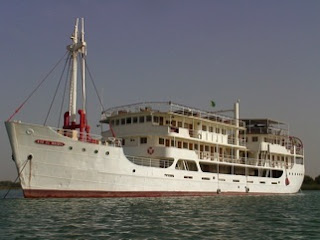Tripatini
the world's smartest travel social network
Responsible Cruising in West Africa
Cruise tourism is a billion pound industry focusing on offering quality services to their guests whilst visiting exotic locations with beautiful sceneries. A recent report from the Cruise Lines International Association (CLIA) estimated that cruise tourism in Europe alone generates goods and services worth more than €32bn and provides over 311,512 jobs.
However, over the past few years, this industry has been increasingly criticised for its irresponsible practises and the negative effects that the itinerant boats have on the natural heritage they ‘cruise’ through. Even though the cruise industry has made a significant effort to reduce their negative impact on the environment, according to a presentation I witnessed by Jamie Sweeting, Vice President of Environmental Stewardship and Global Chief Environmental Officer for Royal Caribbean Cruises Ltd, it does not seem that they have concrete policies to provide benefits for local communities in destinations, when I asked the question.
Over the past few weeks, a number of articles have appeared in the digital press about the increasing move of cruise companies towards less explored shores, diversifying their ports of call and using alternative itineraries to break from the norm. Some of these destinations found in West Africa, such as Senegal, Sierra Leone and Ghana are familiar to us at West Africa Discovery.
Let’s take an example of responsible tourism cruising in West Africa to explain how responsible tourism practises can be used to benefit local communities in destinations whilst respecting the local heritage and at the same time provide a positive and unique experience for the tourists participating.
In Senegal, on the west coast of West Africa, a small ship offers its passengers an unforgettable cruising experience along the Senegal River. The trip begins in Dakar where the tourist will be able to experience the vibrant and colourful scenery of a West African capital from which an overland journey will be undertaken to the Jazz Capital of West Africa, Saint Louis. From there, the trip diverts inland to a point where the 6 day cruise will begin. A beautifully refurbished Cruiser, which has been doing this journey for 50 years, will be waiting. Through this cruise, the passenger will learn about Wolof, Tukolor and Moore cultures and will witness the magnificence of the local natural heritage in the Parc Oiseau de Djoudj , the world’s third most important breeding grounds for migrating birds. Each day there will be a stop off in villages or visits old French Forts, gardens in the desert, or the birding reserve. Throughout the trip the passenger will be given a thorough history of the region both colonial and tribal.
“How may this cruise differ from the others? How does it make a difference?” you may ask. Well, Senegal is a great example of modern vibrant, open and progressing West Africa. Tourism has helped fuel their boom but, as with its neighbour The Gambia, it has often been package based holidays around the stunning coast. This type of mass tourism gives very little positive cultural interaction.
This trip however aims to show the participant modern Senegal, by spending some time in Dakar, and then to learn about the historic and cultural background in Saint Louis, followed by a cruise through some of the regions very different cultures. The Cruiser itself has been making the journey from Saint Louis to Podor for over 50 years. In the last decade it was fully refurbished and is now back in action providing an important and much loved communication link along this stretch of the Senegal River. Different communities who live along the river will be visited and they all benefit greatly from their links with the cruiser.
The cruiser is run by a local Senegalese company based in Saint Louis and has long established links with the communities visited on the cruise.
Furthermore, the cruise passes through the world’s third most important breeding grounds for migrating birds thus raising awareness towards the importance of natural conservation to show that this location, used for millennia by various species of birds, is extremely important for the survival of our planets feathery friends.
As you may have gathered, not only does this type of tourism offer the tourist a first-hand insight into the local heritage of a destination visited, thus offering an added value to what has become, from my point of view, a bland industry, but it also aims to give back to the local communities who live along the itinerary. In a region such as West Africa, which is fragile in terms of being easily influenced from outside sources, responsible tourism can offer much needed benefits to local communities as well as reducing the negative effects that tourism can have on local natural, cultural and social heritages.
Videos
Groups
-
Catalonia, Its Culture &…
33 members
-
Barcelona
77 members
-
India
173 members
-
Tour Operators
873 members
-
Ireland
93 members
-
South Dakota
17 members
-
Azerbaijan
17 members
-
Shopping the World
55 members
-
Tech for Travel/Hospital…
87 members
-
Andorra
26 members
-
Online Corner
75 members
-
Minnesota
22 members
-
Backpackers & Hostels
84 members
-
Portugal
60 members
-
Turks and Caicos
26 members
© 2026 Created by EnLinea Media.
Powered by
![]()
Badges | Report an Issue | Privacy Policy | Terms of Service

You need to be a member of Tripatini to add comments!
Join Tripatini